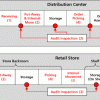Strategic advice to leverage new technologies
Technology is at the heart of nearly every enterprise, enabling new business models and strategies, and serving as the catalyst to industry convergence. Leveraging the right technology can improve business outcomes, providing intelligence and insights that help you make more informed and accurate decisions. From finding patterns in data through data science, to curating relevant insights with data analytics, to the predictive abilities and innumerable applications of AI, to solving challenging business problems with ML, NLP, and knowledge graphs, technology has brought decision-making to a more intelligent level. Keep pace with the technology trends, opportunities, applications, and real-world use cases that will move your organization closer to its transformation and business goals.
Recently Published
In the high-pressure retail environment of the 21st century, industry leaders looking for every competitive advantage are increasingly relying on analytics. This Executive Update explores how to blend analytics with behavioral research for operational success.
Consumerization is the trend for new technologies to first emerge in the consumer space and subsequently make their way into the enterprise world. As enterprise users start comparing the quality of the user experience with consumer applications versus their enterprise counterparts, the demand for better enterprise applications will continue to soar. When designing and architecting new business applications, enterprises need to keep the following considerations in mind:
Corporate Software Risk Reduction in a Fortune 500 Company
After several major software failures, the chairman of a Fortune 500 manufacturing company decided to embark on a corporate-wide software risk-reduction program.
Corporate Software Risk Reduction in a Fortune 500 Company
The chairman of a large manufacturing conglomerate, a Fortune 500 company, was troubled by several major software failures of projects terminated before completion. He was also concerned with the dissatisfaction expressed by customers in the quality of the software the corporation produced and by the inability of software executives to explain why the problems occurred and what might be done to eliminate them.
In this on-demand webinar, Cutter Fellow Ken Orr addresses what you should be looking for in an enterprise architect: What should the architect know? What kind of experience and organization skills should the ideal candidate have?








